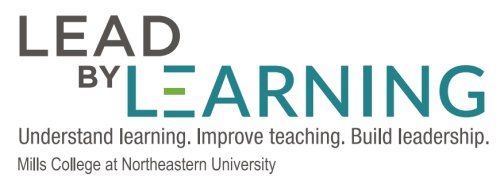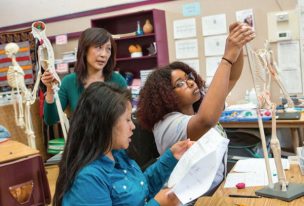
Beyond the Numbers: Gathering “Street Data” to Improve Math Instruction
“When the math is getting more difficult, what happens internally?” I asked one of my 8th grade focal students.
“Yeah… I get annoyed and stressed, and kind of angry, because I don’t understand it. I hate that I don’t understand specific things, and other people say it’s easy. You know how some people shout out ‘It’s hecka easy’ and in my head I’m like ‘Okay, not for everyone, because it’s hard for me.’ Simple math can be hard for other people… it kind of shuts me down, and then I just kind of wander.”
After this interview, my focal inquiry question emerged: How do my students’ impact their learning, and how can I cultivate a more positive math identity to support student learning and engagement?
I wanted to know:
- My student’s’ perception of their ability to learn math;
- If and when they felt successful in the math classroom;
- What motivated them;
- How I could help and shift their mentality in my class.
Through Willard Middle School’s partnership with Lead by Learning, I started identifying as a learner and gathering “street data.” I conducted class surveys, held 1-1 mini-conferences during class, and conducted an in depth interview with a few focal students. I wanted to learn about their experiences in math, what they felt were barriers to success, and their motivations for school. My focal students often seemed unmotivated and lacking in work ethic, which were assumptions I was making based on my observations, but their surface level persona masked a deeper learning insecurity and desire not to appear less than their peers.
From these learnings, I focused on three classroom practices to help support students by inviting engagement, building confidence, and cultivating joy. To invite engagement, I highlighted the student voice. Many students in the class felt behind in their grade level math, so it was easy for language between classmates to be negative about each other’s math understanding. I created activities for students to teach each other with the end goal of shifting their mindset of themselves and their classmates. Success for some of my students in math was felt few and far between, so I created warm ups and activities with access points that helped students experience success and catch onto something they could accomplish in class with confidence. Lastly, to cultivate joy and for students to enjoy being in our math class, I worked on creating games and team challenges to encourage students to experience joy while working on math. These games and team challenges also allowed students to work together and encourage one another.
Through this inquiry cycle, I got to see a clear picture of how students experienced my class. I realized that much more lies beneath the surface of what may appear as an apathetic and checked out facade. Much of the year was spent on finding new ways to encourage my students as math learners. In my year end interviews with a few focal students it was clear impact was made. Students shared:
- “Now I have better ways and different strategies to get the answer.”
- “I feel like I am getting better. I can solve simple math problems faster. I’m a better mathematician than I used to be.”
- “I feel like I have more perseverance than I used to, because the foundations are there.”
Often, we measure success by standardized test scores. Even though some of these students still have a long way to go, quotes like these allow me to believe that students are growing as math learners and building confidence in themselves. Their current successes might not show up on the next Smarter Balance Assessment, but when I take a closer look into their perspective, I see clearly that they are growing, right before my eyes.
Next year, I hope to build on what I have learned this year. I want to create a classroom environment where each student is engaged, challenged, and feels safe to learn. An environment where joy meets rigor and where students are able to learn from one another and grow together. And finally, I want to be a teacher who always makes time to learn about my students beyond just who they are in the classroom. Teaching starts with having an understanding of who you are teaching, and that ultimately starts with me.
 Eric Huang has been a 7th and 8th grade math teacher and intervention coordinator in Berkeley for four and a half years. He prides himself on reaching every student through meaningful connection and relationship building, as well as holding students accountable through engagement and by holding high standards. He believes that every child can learn math, and that mindset is key when supporting the growth of future generations. When Eric is not in the classroom, you can find him accepting 1-1 challenges on the basketball court, enjoying live music (most recently Jacob Collier and Gregory Porter), or eating good food with friends and family.
Eric Huang has been a 7th and 8th grade math teacher and intervention coordinator in Berkeley for four and a half years. He prides himself on reaching every student through meaningful connection and relationship building, as well as holding students accountable through engagement and by holding high standards. He believes that every child can learn math, and that mindset is key when supporting the growth of future generations. When Eric is not in the classroom, you can find him accepting 1-1 challenges on the basketball court, enjoying live music (most recently Jacob Collier and Gregory Porter), or eating good food with friends and family.

